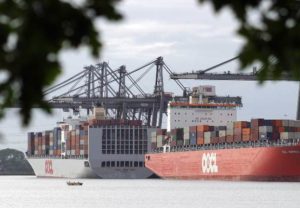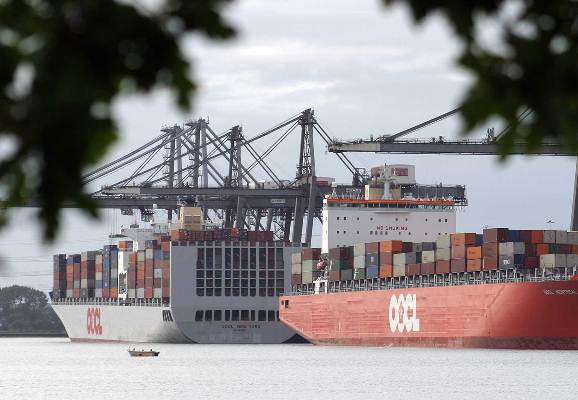 Orient Overseas (International) Limited (OOIL) announced improved financial results in 2017 compared to 2016 owing to a higher-than-expected economic recovery and the stronger volume of traffic on key trade lanes.
Orient Overseas (International) Limited (OOIL) announced improved financial results in 2017 compared to 2016 owing to a higher-than-expected economic recovery and the stronger volume of traffic on key trade lanes.
OOIL in a statement said group EBITDA (earnings before interest, taxes, depreciation, and amortization) jumped to US$691.128 million in 2017 from $288.6 million in 2016, while EBIT grew to $251.304 million from a loss of $120.274 million in 2016.
Profit attributable to equity holders for 2017 was $137.7 million, compared to a loss of $219.2 million in 2016.
Operating profit reached $232 million in 2017 from an operating loss of $138 million in 2016, while revenue expanded to $6,108 million last year from $5,298 million the preceding year.
OOIL’s container transport and logistics business reported EBIT of $105 million, representing an operating margin of about 1.7%.
Liner liftings grew to 6.299 million TEUs from 5.298 million TEUs last 2016.
C C Tung, OOIL chairman, said, “The economic backdrop for 2017 was more robust than forecasters had expected. Following a decade of low growth, we saw healthier performance in both GDP and trade volumes across most of the world’s major economies. This was a welcome change after the industry’s low point of 2016.”
“This synchronicity of growth, a rare phenomenon in recent memory, may bode well for the sustainability of the recovery,” noted Tung.
But he also observed the continued upsizing of capacity on certain key routes. “Ultra-large vessels ordered in the past few years are now being delivered and brought into operation. Furthermore, as trade growth improves, the industry continues to introduce additional services using cascaded or previously idled capacity,” said Tung.
This means that the environment “remains merely one of gradual recovery, not the boom that some analysts expected when improved economic data first started to appear,” Tung said.
During the year, the group took delivery of five of a total of six ‘Giga’ class 21,413-TEU vessels ordered from the Samsung Heavy Industries shipyard.
The last vessel in the series was delivered in January 2018. No orders for new buildings were placed during the year.
2017 was a year of tremendous growth for OOCL in both European and US bound trades, said OOIL.
For full-year 2017, OOCL’s liftings were up 3.6% overall, but up 16.3% on trans-Pacific and 19.7% on Asia-Europe. “This growth outpaced the already strong volume growth seen in the market as a whole,” said OOIL.
Tung said that its Ocean Alliance with COSCO, CMA CGM and Evergreen is now almost into its second year. “Alliance membership continues to deliver meaningful benefits in terms of network and scale, and very much remains part of delivering our growth strategy,” he continued.
The company said it will also continue to build up its digital technology and build out its logistics business.
“The OOIL group remains fully committed to continuing its quest to invest in the development of digital technology,” Tung added.
2017 has been a year of considerable growth for the group, he said, noting that this growth was achieved without a deleterious effect on the profit and loss account. “We have now taken delivery of all six of our 21,413 TEU ships, with these titans of the sea providing us not only with additional capacity, but also with a more efficient cost base,” noted Tung.
“Once the large new vessels scheduled to be delivered in 2018 have been brought into service, with a comparatively low order book for 2019 and 2020, and taking into account the improved economic data, we are hopeful that the industry may start to enjoy greater stability than it has done for many years. In the meantime, we maintain a positive, if somewhat cautious, stance,” said Tung.
“Against this gradually improving economic background, and in the context of a consolidating industry, the future for OOIL appears to be promising. We are well placed to continue to grow, and look forward to maintaining our track record of being amongst the most consistently highest performers in the industry,” Tung concluded.
OOIL owns one of the world’s largest international integrated container transport businesses which trades under the name “OOCL.”





